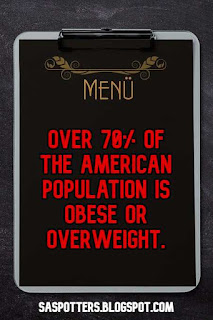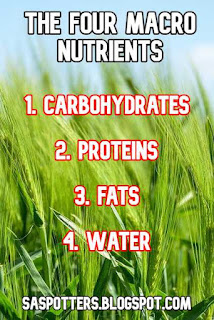Out of (portion) control
Where have we gone wrong?
It is not so hard to figure out.
Our obesity rates have skyrocketed in the United States and the rest of the world. I hate to say it being an American, but we own the prize. The United States has the highest obesity rate in the world.
We take home the gold, but I am not sure it is an award that we want to win. Over 70% of the American population is either obese or overweight according to BMI numbers.
A BMI of over 30 is considered obese and a BMI of over 25 is considered overweight. BMI or body mass index is not a perfect evaluation of body composition, but it gives us a good estimate.
There is a significant difference between being overweight and being obese.
Regarding health, being obese is far more problematic than being overweight. The obesity trend is what needs to decline. How do we reduce obesity?
Before we figure out how, we need to look at how it got this far.
 |
| Obesity is a big problem. |
What happened?
Portions have grown exponentially.
We have gotten out of control as a nation with our portion sizes of food.
When you go to a fast-food restaurant or sit-down restaurant, the portions have increased drastically compared to decades prior.
Restaurants are businesses. We can’t blame them. We must take responsibility for the foods we eat and how much we eat.
We first take responsibility by learning the calorie content of the foods we eat. Secondly, we take responsibility by deciding how much of it to eat.
Later I will give examples of how much the portions have changed.
 |
| We eat more at every meal. |
Food basics
The only way to lose weight is to burn more calories than what you eat.
You must put fewer calories in your mouth than what you use - period. It’s plain and simple.
I understand that it’s not easy.
It’s a simple concept, but I know that it’s very hard to learn how to eat moderately.
I’ve worked with people for over 25 years in the personal training industry and I know that diet is the hardest part for some people.
It takes a calorie deficit of 3500 calories to lose one pound.
This comes from eating less or moving more - or a combination of both (which is preferred).
If you create a deficit of 500 calories per day you will lose one pound per week. If you create a deficit of 1000 calories per day you will lose 2 pounds per week.
Knowing this is easier than doing this, but understanding this helps you get started.
 |
| Eat less. Burn more. |
Macro nutrients
Another nutritional basic that we should understand is macro nutrients.
The type of food that you put in your mouth makes a big difference.
What are the 4 macro nutrients?
1. Carbohydrates
2. Proteins
3. Fats
4. Water
Caloric content of the macro nutrients
1. Carbohydrates have four calories per gram
2. Protein has four calories per gram
3. Fat has nine calories per gram
4. Water has zero calories per gram
Our diet should be 45-65% carbohydrates, 15-35% fat, and 10-20% protein.
The ranges depend on your activity levels and type of activity. If you are active you will need more carbohydrates.
Protein is the most over-eaten macro nutrient in the American diet.
The myth is that we need more when we are active. What we need is more carbs.
 |
| We eat too much protein. |
Back to what caused widespread obesity
How did we become so obese?
Food sizes have gone up exponentially.
In the 1960’s a basic McDonald’s meal was a hamburger or cheeseburger, French fries and a milk shake. They only had nine items total on the menu.
A hamburger at McDonald’s in the 1960’s had 250 calories and a cheeseburger had 350 calories.
Today a Big Mac, which is the more commonly sold item, has 563 calories.
French fries in the 1960’s at McDonald’s had 350 calories. A large fry now has 610 calories. A total meal at McDonald's in the 1960’s was 590 calories. The soda sizes were 12 ounces and 150 calories. Today they are 32 ounces and 370 calories.
If you order a total meal now at McDonald’s here is the calorie content: 1543 calories compared to 590 calories in the 1960’s.
That is a simple increase in size my friends. What happened? It’s clear.
I am not picking on McDonald’s. They are clear and open about their calorie contents.
All restaurants and convenience stores have increased their serving sizes. They are simply responding to consumer demand.
At Burger King a Whopper has 677 calories. The Baconator from Wendy’s has a whopping 970 calories.
There are now places like WAWA and 7-11 where people can go in and get fast food whenever they want. In the 1960’s this “convenience” was not there.
 |
| We've gone too far. |
There are a lot of calories in coffee products
Now, let’s look at coffee.
If you went to McDonald’s in the 1960’s, your coffee would cost you five calories.
Good luck ordering mocha Frappuccino in the 1960’s! They did not exist.
Now if you get a latte at a Starbucks or similar place it will cost you 160 calories or 360 calories if you order mocha!
What happened to just a coffee?
Back to the Frappuccino; it has 520 calories.
These places wouldn’t make these super high calorie drinks if Americans weren’t demanding them.
We eat too many calories at ball parks
Next on the list are ball parks. We used to go to games and watch games!
In the past a hot dog was 150 calories and a soda was 150 calories. You won’t climb up the BMI scale too much with that home run.
Now you can get it all.
A common food item at the ballgame is cheese fries with 629 calories.
You can order a corn dog with 460 calories and a basic hot dog has now grown to 290 calories - almost doubling.
Why is that? American’s want more beef (or whatever it is).
You can’t fault the companies. They wouldn’t serve it if Americans didn't buy it.
Over eating has become too easy
It could be argued that people could have eaten more in the 1960’s and obesity rates would have been just as high. This is true.
It’s not like humans have simply learned how to eat more than we used to.
It’s simply that it’s easier to eat more than it used to be.
Again, I’m not making any excuses. The sizes have gotten bigger and we’re gobbling them up.
Decades ago, if you wanted to consume those kinds of calories in a brief period you would have had to work for them.
You would have had to make extra food in your own kitchen or doubled up on serving sizes. This would have cost you money.
The fact is that it’s quite easy to consume way more calories than you need.
We move less than we used to
This isn’t the only reason that obesity rates have skyrocketed.
I mentioned that energy in must be less than energy out to lose weight.
The energy out part is activity.
We don’t move like we used to.
We don’t have physical education in schools like we used to. Kids aren’t moving outside like they used to. So many devices do simple things for us that we used to do. Adults have far more sedentary jobs than they used to.
Our portions are out of control and we don’t move like we used to.
The obesity crisis has been explained.
 |
| Technology does the work for you. |
What do we do about obesity now?
I believe that the first step to any change is awareness.
I believe that if most people knew how many calories are in these high calorie convenience foods, they wouldn’t choose them.
The restaurants are giving calorie numbers now. It’s not like they’re hiding them.
We need to be aware that these high calorie numbers are making us gain weight and that we don’t need them.
Another thing that people really need to understand is that it’s not about carbs, proteins, and fats.
Quit going on the internet and finding the next fad diet. The enemy is too many calories - period.
If you always choose the lowest calorie food with the highest nutrients you will stop battling the bulge as much as you do.
For example, broccoli is a very nutrient dense food because it’s low in calories and high in micro nutrients (vitamins and minerals). A Big Mac is the opposite. It’s extremely high in calories and extremely low in most nutrients.
Be mindful. Places serve fast foods are aware that you choose them because you are in a hurry. Slow down.
Do you really need that big drink when you're simply fueling up for gas? Do you have to stop at the 7-11 and grab food out of a bag?
The other thing that’s quite different from decades ago is that families don't sit down and eat together anymore. It’s fast food - food on the run.
Why do you have to eat like that? I always tell my clients to delay the gratification. The food ads at these places pop up on purpose.
People get paid big bucks in the marketing department to get you to buy food on impulse. Marketers know that humans are very impulsive.
We see that tasty drink sign and order it when we are not even in need. Say no.
Delayed gratification doesn’t mean forever. It means for now. Just wait unit your next meal. Eat then. You won’t miss it.
 |
| Just wait. |
Summary
We have gained weight over the decades worldwide because we consume far more food than we used to. We consume much more that what we need.
The places that sell food have made it easier for us to eat more. We can’t blame them. They sell food to make money.
We need to be aware of what is best for us.
We can all be better. In this case, better means smaller food choices.
Fast food restaurants will most likely not change any time soon. Convenience stores are not going to stop selling Big Gulps.
We need to understand just how costly these choices are. Our best defense is to understand what the real problems are.
 |
| Examine your choices. |
This article is written by Rob Maxwell, M.A. Exercise Physiology, CSCS and ACSM CPT from www.fittothemax.net. Follow him on Twitter.




No comments:
Post a Comment